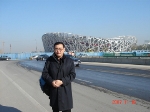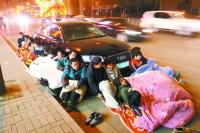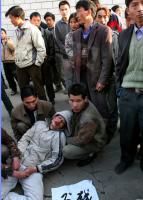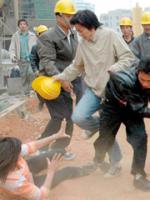
I had to exit the highway because of a traffic jam on my way back to Guangzhou after a trip to Shenzhen recently. Suddenly I saw a number of police vehicles in front of me, several of which had warning lights flashing.
Before I could figure out what was going on, my driver Wei Ge said, “there must be an incident there, ” And he immediately added, “how fucking rich this place is!”
I asked him what was going on and why he said that. He pointed to the front and told me that there must be some people staging a protest. I looked out of my car window and indeed saw a lot of people who seemed to be gathering at a construction site. But my view was partly blocked by a row of police vehicles. We pulled our car closer to the site so I could look over the vehicles. But my view was blocked again by a line of dozens of policemen.
What happened? Why were people gathering to protest? Why were so many policemen here? My driver Wei Ge should be right in his judgment since he drives around this area a lot. I gestured to him to pull over, but he didn’t stop the engine until he drove forward for about a hundred meters and passed a traffic light. Cars were not allowed to park here because of the police, he said. After we got out of the car, we pretended to be random passers-by, walking cautiously towards the site. I could finally look through the dozen police vehicles and several dozen policemen.
However, what I saw was security guards in grey uniforms. There were at least 50 of them standing together forming a big circle. Those encircled must be the “trouble-makers”. They were definitely not as many as the guards, since they were besieged inside. They must have been shorter because I could only see their unkempt hair while looking over the robust shoulders of the tall guards. Otherwise I could only see some of their clothes and shoes, the kind of ragged clothes that migrant workers usually wear. They all seemed to be fairly young.
My driver Wei Ge continued to comment, “Wow, this place is so rich. They sent out so many police vehicles, policemen, and security guards to deal with a few migrant workers. How wealthy it is! Gosh!”
He was innocuous in making his remarks but it struck a chord in me. I wanted to walk closer to take a few pictures since I had my camera with me. But I started to hesitate when I got closer the the line formed by the police. I was suddenly struck by fear. Wei Ge reminded me to be cautious too – it had only been a few days earlier when the Tianmen City Administration Officers beat to death a passer-by who took photos of them.
That day was perhaps the first time in my life that I was frightened by the black uniform of the police. I stopped there and didn’t pull out of my camera in the end. Wei Ge told me that they wouldn’t allow me to take pictures even if I took out my camera, because there were a few policemen staring at me, for I didn’t look like a local.
But what could I catch with the camera? I could look through the police vehicles and police, but I couldn’t look through the thick circle of well-dressed security guards. I hadn’t managed to see a single face of the “trouble-makers” by the time I left the site that day.
Many migrant workers wanted to get paid so they could go back home with the money as the Spring Festival was approaching this time of year. But unscrupulous employers purposely delay paying the workers. They withhold a few months’ salary trying to make the workers come back in the following year after the festival. Therefore there had been a number of incidents recently of workers seeking payment from their employers, according to what Wei Ge told me inside the car.
I am aware of what Wei Ge was talking about. More than 200,000 mass incidents, small or big, take place in China each year, according to statistics announced by the Chinese government. Most of them are caused by conflicts between employers and employees, in other words, between the rich and the poor. However, I haven’t personally experienced many such incidents. Today is the first time that I did “experience” one – I put a quotation mark here because I actually didn’t see the faces of the “trouble-making” migrant workers, nor did I figure out why they gathered at a construction site and refused to leave.
My heart is heavy, however. It’s heavier than the number – 200,000 mass incidents in the country each year. The heaviness in my heart didn’t subside, but instead turned into sadness and sorrow, long after my car had gone back to the highway.
To be honest, I didn’t see any improper behavior on the part of the police who were maintaining order at the site with a dozen vehicles. ( I dared not take pictures out of fear of them, but they didn’t seem to be ready to beat me to death.) I didn’t see the able-bodied guards treating the migrant workers badly. But those “trouble-makers”, who were besieged in the middle and whom I didn’t manage to see, came to stay in my seemingly strong but vulnerable heart. I have been thinking about them although the episode happened a few days ago. That’s why I write it down today.
Mr. Mao Yushi [a well-known economist in China] said recently that “We should speak for the rich and work for the poor,” arousing a lot of debate. I can’t figure out how Mr. Mao is going to work for the poor. Perhaps he has worked silently for the poor so he didn’t talk much about it. His words seem to make sense theoretically. But I feel it’s hard for me to accept them into my heart if I put them into the context of the reality of contemporary Chinese society.
It’s undeniable that a majority of China’s business elites come from the families of power, and thus have close relations with those in power. It’s known to all Chinese that the rich always get their way in contemporary Chinese society. They can make officials and intellectuals work for them through the power of their money. The law protects the rich. And the rich can get more than what the law grants them with their money. Therefore, it’s unnecessary for Mr. Mao Yushi to speak for the rich, since their opinions can be heard through the power of their money, and they can also buy those in power to speak for them. The intellectual elites should just shut up, if they don’t speak for the poor or work for the poor, for it’s a shame for them to speak loudly for the rich or for those in power.
The reality we are faced with right now is that the poor are so vulnerable and weak. Their situation is pathetic. The reason why there are so many protests staged by the disadvantaged people recently is not because our law doesn’t protect the poor, but because the rich collude with officials to manipulate the law, together with the cheering and help of intellectuals. They’ve made their own law – an invisible law that imposes itself above the Constitution and our legal system. The poor don’t rise up unless they are pushed too hard – and their struggle is so lamentable, because all they are trying to do is to have their grievances heard by officials.
I can’t figure out why the rich people, who are leading a life of debauchery, breaking the law, and having one or even several concubines, become a cherished group in our “harmonious society.” Why isn’t their behavior regarded as harming social harmony when they blackmail and oppress the poor? Only when a few of the oppressed people gather and seek the protection of the constitution and the law, do we say that our “harmonious society” is threatened, and a large number of police are dispatched to watch them. Why is that?
We might reflect on all the protests by the disadvantaged people in the past five years, or even in the past ten years. Which one of them was not caused by oppression by the rich people and those in power? The poor wouldn’t have stood up if they were not pushed to the edge. But has anyone ever said that the rich or those in power are elements of social instability? Tons of police and security guards are dispatched as soon as the disadvantaged people stand up, as if the so-called social harmony is being damaged. Why are we only targeting the poor? Why don’t we look at the problems of the rich? Why don’t we take preventive measures when the rich are exploiting the poor? Where are our police when the poor are calling for justice?
I made friends with a few migrant workers during my social research in the year 2007. Many of them came to me for help since then, sometimes for their own problems, sometimes for their friends. Most of their problems are caused by employers not paying their salary. But how could I help them? All I could tell them was to go to the labor arbitration offices, go to the police, or local government departments. The workers are more experienced in this than me – they know very well that it’s futile to go to the arbitration office, or to the police, not to mention local government officials. Yes, indeed, they all know that it’s useless. That’s why they come to me, hoping that I could expose the injustice and help them out. But how I wish they knew that I could do nothing, either. The Internet is the only place where the disadvantaged people can utter their grievances right now. But the Internet isn’t a place the disadvantaged can control. Those in power pay no heed to the outcries of the disadvantaged. The officials only dismiss them or even arrest them when their own interests are threatened.
I disappointed a number of migrant workers who looked up to me to help them. There were more than a dozen of them that asked me to help to get them paid in 2007. I succeeded in helping just one person. Her employer didn’t budge until I threatened to expose his wrongdoing to the public by pretending to be a journalist of some newspaper. I am ashamed that I broke the law while trying to help a female migrant worker to get her lawful payment of 2, 000 yuan (US$280).
Why isn’t there a law enforcement team that is designated to protect the most vulnerable in our society, when there is a powerful team of city administration officers who are harsh to street vendors and beat to death a passer-by who just took a few pictures?
I would be going back and forth on the highways if the section between Guangzhou and Shenzhen were not under repair. I might be indignant when I read about the big number of mass incidents in China each year. I might write a few articles and win some applause from my readers.
I drove down the highway by chance a few days ago, and witnessed a small incident that might not ever be counted into national statistics.
What did I see? I saw several migrant workers, many of whom were young– not much older than my own children. They finally gathered their courage and decided to stand up against their unscrupulous employers after they could no longer bear their suffering.
Soon a large number of well-organized security guards showed up and encircled them, and then a dozen police vehicles came with their sirens wailing. The several migrant workers, who are not fed well, not tall enough, and unkempt, were besieged inside several tight circles.
I didn’t see their faces. But I could imagine their expressions – full of anger, fear and despair. My poor brother migrant workers, you poor kids. How could you not be frightened when encircled by so many police, police vehicles, and security guards?
You are so miserable and vulnerable. My heart aches for you…










